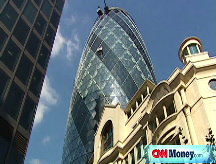Oil out with a bang with 14% spike
Crude prices rally near the close of trade as Russia moves to cut off natural gas supplies to Ukraine.
NEW YORK (CNNMoney.com) -- The price of oil jumped Wednesday, capping a volatile year with a swing of $7 from the session low to the close, as investors responded to news of a possible supply disruption in Europe.
Light, sweet crude for February delivery rose $5.57, or 14.2%, to settle at $44.60 a barrel on the New York Mercantile Exchange.
U.S. markets will be closed Thursday for the New Year's holiday and many market participants were off Wednesday - factors that amplify small moves in the market.
The rally picked up steam in the afternoon following reports that Russian energy giant Gazprom will cut off gas supplies to neighboring Ukraine beginning Thursday because of a dispute over unpaid bills. The supply disruption could effect energy prices in western European markets.
But the implications of Russia's decision are not immediately clear and the market may be overreacting, according to Peter Beutel, oil analyst at Cameron Hanover.
"On a day that was very thinly traded, people were looking for anything that they could grab on to," Beutel said. He added that much of the buying was "short covering," which involves unwinding bets that an asset price will decline.
2008: For the year, oil prices are down 61%, compared with a 57% increase in 2007. The staggering decline comes in the same year that saw oil spiking to an all-time high.
Prices broke through the psychologically important $100 a barrel mark in February. They kept rising during the summer as investors bet that robust global demand would outpace the world's limited supply of crude.
As prices soared to unheard of levels, the role of "excessive" speculation in the oil market became a major issue.
But all that changed abruptly as the global economy deteriorated and demand for oil and gasoline evaporated. At its current level, the price of oil is more than $100 below its July peak price of $147 a barrel.
2009: Looking ahead, analysts say oil could rebound next year.
"So much of the dim economic outlook is priced in," said John Kilduff, an energy analyst at MF Global in New York. "Things should look up next year."
Falling prices have caused many oil companies to limit their investments in new exploration projects, which could result in another supply shock next year, Kilduff added.
"The supply picture could tighten quickly," he said. "With various projects being scrapped or tabled, we may end up paying for that later."
In the short run, oil prices could be supported by geopolitical tensions, particularly the conflict between Israel and Hamas militants in the Gaza Strip.
Oil rose above $42 during Monday's session, when Israeli warplanes first attacked Hamas targets.
While the fighting in Gaza does not immediately threaten any oil installation, it signals that "we're entering a mischief period for the players in the Middle East," Kilduff said.
Supplies: In its weekly inventory report, the Energy Information Administration said crude stocks rose by 500,000 barrels last week. Analysts were looking for a drop of 1.75 million barrels, according to a survey by oil research firm Platts.
Distillates, used to make heating oil and diesel fuel, expanded by 700,000 barrels while gasoline supplies added 800,000 barrels. Analysts were expecting distillate supplies to grow by 1.3 million barrels and gasoline stockpiles to have increased by 1.75 million barrels.
Gasoline: Retail gas prices edged up overnight, according to a survey by the American Automobile Association.
AAA reports the national average price for a gallon of regular unleaded gasoline rose one-tenth of a cent to $1.617 a gallon, ending 11 days of consecutive decreases.
The current national average is now $2.49 below or 60% off July's record high price of $4.114 a gallon.
The last time the national average price for a gallon of regular unleaded was near the current price was Jan. 27, 2004, when it averaged at $1.617. ![]()



